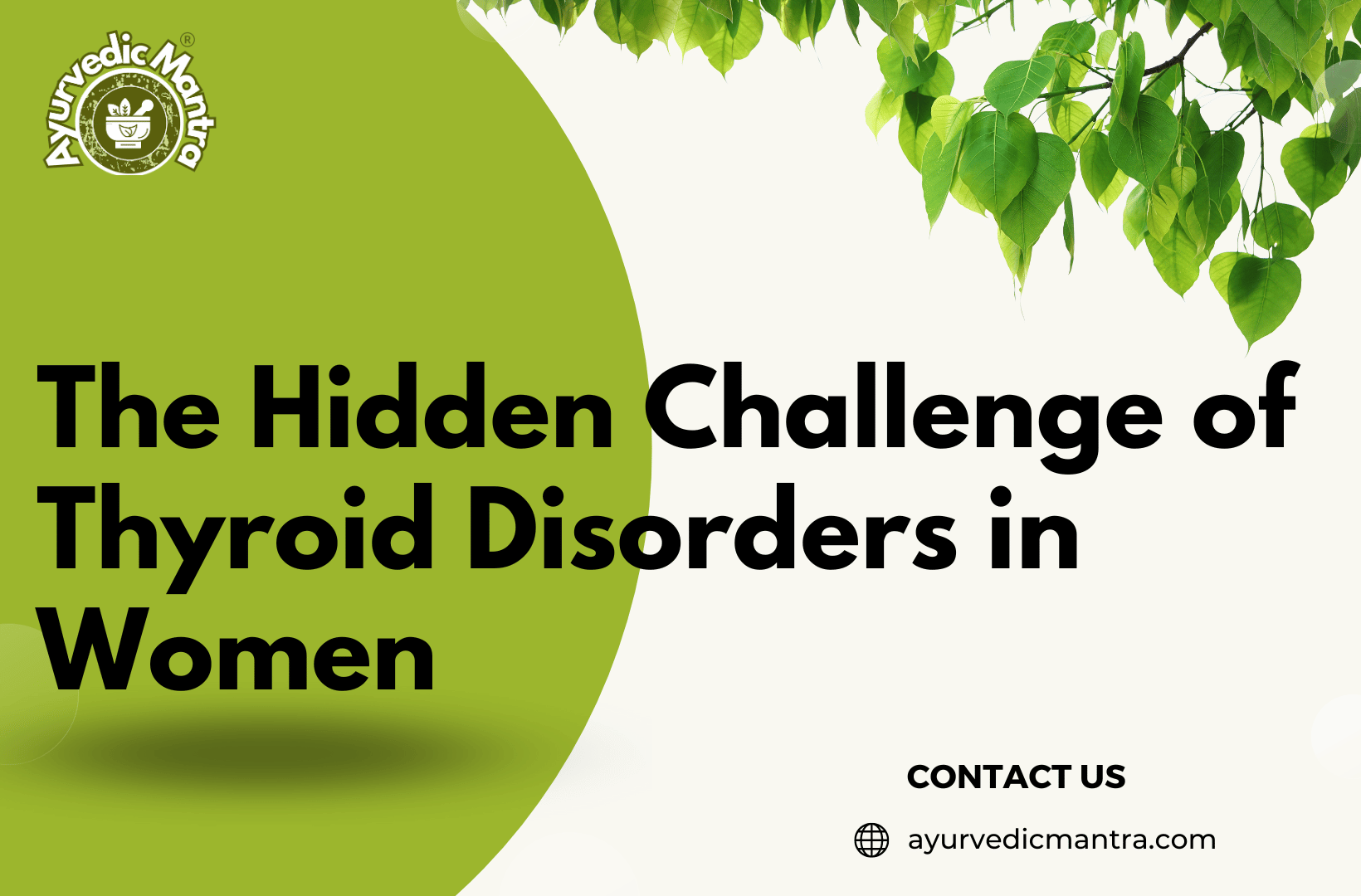
PCOD/PCOS: Ayurvedic Treatment is Best
Introduction Polycystic Ovary Disorder (PCOD) or Polycystic Ovary Syndrome (PCOS) is a common endocrine disorder affecting millions of women worldwide. It leads to hormonal imbalances,

Although commonly discussed in medical circles, thyroid disorders remain a hidden challenge for many women. The thyroid gland, a small butterfly-shaped organ in the neck, regulates various bodily functions. Regarding women, thyroid issues can have far-reaching effects beyond physical health, impacting their emotional well-being and overall quality of life.
The thyroid gland produces hormones that help control metabolism, energy levels, and the functioning of organs throughout the body. It’s a delicate balance; even a slight disruption can lead to significant consequences. Women are particularly vulnerable to thyroid disorders due to hormonal fluctuations during various life stages, such as puberty, pregnancy, and menopause.
Thyroid disorders can manifest in several ways, each with its challenges. Hypothyroidism, characterized by an underactive thyroid, can lead to weight gain, fatigue, and depression. On the other hand, hyperthyroidism, an overactive thyroid, can cause anxiety, rapid heart rate, and weight loss. These symptoms not only affect physical health but also affect mental and emotional well-being.
Beyond the physical symptoms, the emotional impact of thyroid disorders in women is often overlooked. Fluctuating hormone levels can contribute to mood swings, irritability, and cognitive issues. Many women grapple with a rollercoaster of emotions, unsure of the root cause. This hidden challenge can strain relationships, affect work performance, and diminish overall life satisfaction.
Women’s thyroid health needs change throughout their lives. During pregnancy, for instance, thyroid dysfunction can pose risks to the mother and the developing baby. Expectant mothers need proper medical care and monitoring to ensure a healthy thyroid function. Similarly, menopause can bring about thyroid imbalances that exacerbate the already complex changes occurring in the body.
The journey to managing thyroid disorders begins with awareness and education. Women need to prioritize regular check-ups and open communication with healthcare providers. Proper diagnosis and treatment can make a difference in alleviating the symptoms and challenges posed by thyroid issues. Lifestyle factors, such as maintaining a balanced diet, managing stress, and staying physically active, can also support thyroid health.
In an era where information is at our fingertips, empowering women with knowledge about thyroid disorders is paramount. Online resources, support groups, and community networks can provide a sense of belonging and validation for those dealing with thyroid-related challenges. When women share their experiences and insights, they create a space where others feel understood and supported.
The hidden challenge of thyroid disorders in women goes beyond physical symptoms, extending into emotional well-being and overall quality of life. Understanding the thyroid’s role, recognizing its impact on health, and navigating different life stages are all essential steps toward taking control of thyroid health. By fostering awareness, encouraging open dialogue, and providing access to resources, we can shed light on this often-overlooked issue and help women lead healthier, more fulfilling lives.
Thyroid disorders refer to conditions that affect the normal functioning of the thyroid gland, a crucial organ responsible for producing hormones that regulate metabolism, energy levels, and overall bodily functions. Women are more susceptible to thyroid disorders due to hormonal fluctuations during various life stages, such as puberty, pregnancy, and menopause. These disorders can lead to physical and emotional symptoms, impacting health and quality of life.
Thyroid disorders can manifest in a variety of ways. Common symptoms of an underactive thyroid (hypothyroidism) include weight gain, fatigue, depression, and cold sensitivity. Conversely, an overactive thyroid (hyperthyroidism) may cause anxiety, rapid heartbeat, weight loss, and irritability. Women may also experience menstrual irregularities and fertility issues due to thyroid dysfunction.
Hormonal changes during pregnancy and menopause can significantly impact thyroid health. Pregnancy increases the body’s demand for thyroid hormones, and any imbalance can affect both the mother’s and baby’s health. Menopause, on the other hand, can exacerbate existing thyroid issues due to the natural decline in hormone production. Women in these stages need proper medical care and monitoring to ensure thyroid health.
Yes, thyroid disorders can profoundly affect a woman’s emotional well-being. Fluctuations in thyroid hormone levels can contribute to mood swings, irritability, and cognitive difficulties. Many women struggle with unexplained dynamic changes, impacting relationships, work performance, and overall quality of life. Recognizing and addressing the emotional impact of thyroid disorders is essential for holistic health.
Managing thyroid health involves a multi-faceted approach. Regular check-ups with healthcare providers are crucial for proper diagnosis and treatment. Lifestyle factors such as maintaining a balanced diet, managing stress, staying physically active, and getting adequate sleep can all support thyroid health. Women must be proactive, ask questions, and advocate for their well-being.
Yes, pregnancy-related thyroid disorders can harm both the mother and the baby. Untreated thyroid dysfunction can lead to complications such as preeclampsia, preterm birth, and developmental issues in the baby. Pregnant women with thyroid disorders should work closely with their healthcare providers to ensure optimal thyroid function and reduce potential risks.
There are numerous resources available for women dealing with thyroid disorders. Online platforms offer information, support groups, and communities where women can share their experiences and seek advice. Local healthcare facilities, clinics, and medical professionals specializing in endocrinology can provide personalized guidance and treatment options for managing thyroid disorders.
Lifestyle changes can play a significant role in managing thyroid disorders. Adopting a balanced diet rich in nutrients, managing stress through relaxation techniques or mindfulness, engaging in regular physical activity, and ensuring adequate sleep can all positively impact thyroid health. Working closely with healthcare professionals to create a personalized plan that suits individual needs is essential.
While lifestyle changes can support thyroid health, consulting with healthcare providers before pursuing natural remedies or alternative treatments is crucial. Some supplements, herbs, and practices may interact with medications or have unpredictable effects on thyroid function. It’s always recommended to seek medical advice and avoid self-treatment when dealing with thyroid disorders.
Raising awareness about thyroid disorders in women requires a collective effort. Healthcare organizations, advocacy groups, and individuals can contribute by organizing educational campaigns, sharing accurate information on social media, and promoting open discussions about thyroid health. By destigmatizing the topic and providing accessible resources, we can empower women to take charge of their thyroid health and overall well-being.

Introduction Polycystic Ovary Disorder (PCOD) or Polycystic Ovary Syndrome (PCOS) is a common endocrine disorder affecting millions of women worldwide. It leads to hormonal imbalances,

Introduction Losing weight is a journey that requires dedication, consistency, and self-care. While there are numerous weight loss techniques out there, not all of them

Polycystic Ovary Syndrome (PCOS) is a hormonal disorder that affects millions of women worldwide. It can lead to various health complications, such as irregular periods,

In recent years, Ayurveda, an ancient system of natural healing originating from India, has gained significant popularity as an alternative approach to treating various health

आजकल वजन बढ़ने और चर्बी की वृद्धि होने की समस्या एक आम समस्या बन गई है। बढ़ते वजन और अतिरिक्त चर्बी के कारण न केवल

प्रस्तावना: आजकल वजन बढ़ने और ओबेसिटी की समस्या एक आम समस्या बन गई है। बढ़ते वजन के कारण न केवल शारीरिक समस्याएं होती हैं, बल्कि
